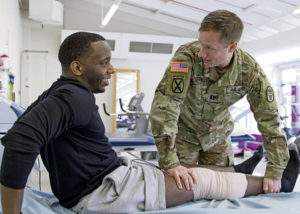
Rehabilitation specialists from Landstuhl Regional Medical Center recently participated in a joint medical training exercise with their counterparts in the Ukrainian Ministry of Defence at a military hospital in Lviv, Ukraine, in efforts to build key relationships and increase levels of interoperability.
The exercise, part of the Military Health System’s Global Health Engagement initiative, allowed for the sharing of interdisciplinary best practices, standardization of processes and discussion of medical resources and capabilities.
“We go teach (Ukrainian rehabilitation specialists) on specific topics during each engagement,” said Capt. Daniel Huffman, assistant chief of Rehabilitation Services at LRMC. “This gives them some new things to work on.”
During the exercise, LRMC specialists, along with rehabilitation specialists from the 7th Medical Support Unit-Europe and Walter Reed National Military Medical Center, discussed electrodiagnostic medicine, cardiac rehabilitation, traumatic brain injury, spinal cord injury and musculoskeletal medicine. Following lectures by the Americans, Ukrainian specialists performed hands-on training on Ukrainian patients to test effectiveness.
“It’s very rewarding and beneficial to (participate in the exercise),” said Huffman, a physical therapist by trade. “It’s really good for me to go and see what level they are practicing at.”
The most recent journey to Ukraine is the seventh medical exercise over the past three years. Although staff consisted of rehabilitation specialists, previous collaborations also included physicians, behavioral health specialists, and nurses.
“Our team provides lectures, case presentations, and hands-on training focused on sharing our current best practices for rehabilitative interventions and goals with our Ukrainian allies,” said Terry Fee, a physical therapist at LRMC who has participated in five medical training exercises with the Ukrainians. “All major Ukrainian military medical centers are represented with approximately 30-40 attendees per session. Proficiency in rehabilitation techniques are immediate – often the techniques we discussed in lectures, actual case presentations, and smaller group lab demonstrations are implemented within one day.”
Since 2014, conflict in Eastern Ukraine has resulted in an estimated 13,000 casualties, with more than 30,000 wounded, according to the United Nations. By connecting with allies and coalition partners, the providers have a better understanding of health capabilities and enhanced interoperability, resulting in improved quality of care for patients.
“(Ukraine) has some very complex patients who are Soldiers, families, and friends, (and their) rehabilitation specialists are highly dedicated to what they do,” said Fee. “We all share a common goal: To provide the best rehab possible in order to obtain the best outcome for their patients. We are all the same.”
Although the Department of Defense has been engaged in issues of global health for over a century by providing humanitarian assistance, disaster relief, combating disease and reducing health threats, efforts have shifted toward building and supporting the health system capacities of partner nations. Through these efforts, partner nations and allies are trained to be more capable and ready to support the health needs of their troops and populations.
“I was very impressed with the level of care they were providing but could still see where they needed more help,” said Huffman. “Through the initiative, we’re trying to help them clinically improve their skills because in the end it’s all about trying to return their Soldiers back to (better health).”
Even though current best practices are shared between American and Ukrainian specialists, resourcing the efforts to improve care in Ukraine remain a challenge.
“(Americans) are lucky to live in a country where we have timely access to highly trained personnel, equipment, facilities, financial resources, and adaptive equipment at our fingertips. I was impressed with the innovation our allied rehab specialists utilized in designing ‘homegrown’ rehab tools and kits to get the job done,” said Fee. “We continue to learn from each other and I am extremely impressed with the level of compassionate care, hard work and innovation that Ukrainian rehab specialists put into treating their patients each and every day.”


